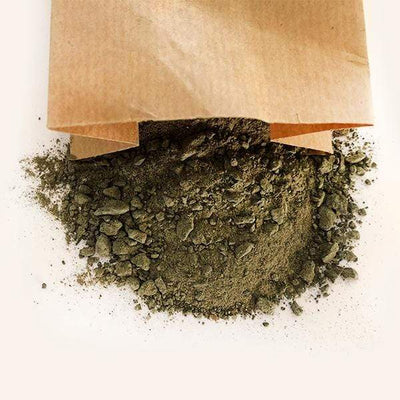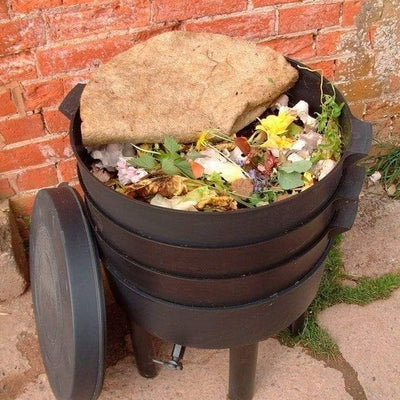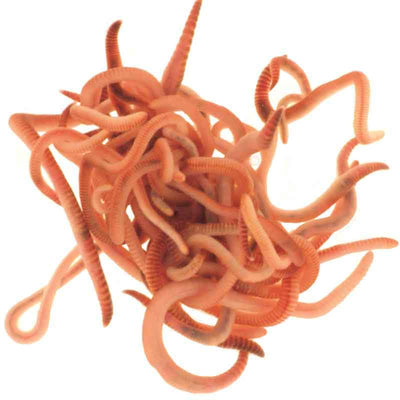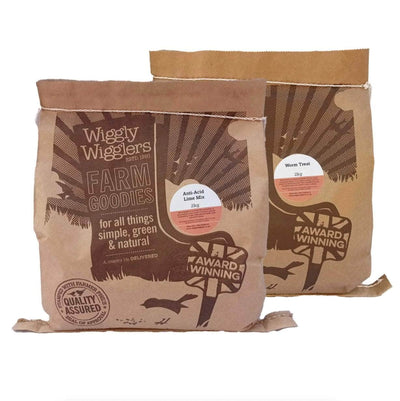What Can I Do If My Compost Is Too Wet?
To correct wet compost we recommend reducing the amount of green waste (fruit, vegetable, kitchen scraps) and increasing the percentage of brown waste (dry grass, leaves, paper).
Generally the mix should be 50/50. However, in the case of wet compost it is necessary to increase the percentage of brown waste temporarily in order to get the mixture balanced again.
Once the mixture is moist (without being wet) it will be possible to revert to a 50/50 composition.
Exposure to sunlight and increased aeration are also helpful in getting the compost back to its correct balance.
How Often Should I Mix The Compost?
If your compost tends to be rather too dry or too wet (or you are not sure how it is going), mixing the contents of the bin now and again gives you the opportunity to adjust the balance of materials. It can also speed up the process if the heap is short of air.
Turning and mixing is made easy with a Compost Tumbler. However, material in a Tumbler can dry out, and you need to make sure it is sufficiently moist for the composting process to proceed effectively.
How Do I Get Rid Of Ants?
The presence of ants can indicate that the compost is too dry. If this is the case, mix in wetter materials or lightly water the mixture.
Why Is It Taking So Long To Get Compost?
If you are new to composting, you may just need to be patient.
Composting is a biological process that does take time and slows down in cold weather. It will also be slower if the compost is too dry, or the contents are all rather tough. Try adjusting the moisture level and mixing in grass clippings and other materials that are quick to rot. Chopping up your organic waste before depositing it into your composter will also speed up the process (by exposing more surface area to microbes).
Can I Make Compost In Just A Few Months?
Yes, if ‘Greens’ ( grass clippings and vegetable scraps) and fine ‘Browns’ (shredded leaves and dry herbaceous plants) are composted in a Tumbler that is kept moist, turned regularly and kept in a sunny position
To make compost quickly in a traditional garden compost bin you will need to fill it completely in one go using a good mixture of green and brown materials (chopped up or shredded if chunky). You will notice that the contents of the bin will begin to get hot in a few days (this is a good thing!) Once they have cooled down, mix the heap well with a pitchfork or compost aerator. This keeps the pile uniform in consistency and helps introduce oxygen to the microbes. Keep on mixing every few days until the heap has turned into usable compost.
It is also important to note that external temperatures play an important part in the rate at which organic waste can decompose into compost. This is the reason why composting is faster in summer than in winter.
I Have Large Amounts Of Autumn Leaves. Can I Add Them All To My Composter?
A large quantity of leaves at once could throw the composter’s carbon/nitrogen composition out of balance. Instead you can add them, wet, into black plastic sacks (or into a simple wire mesh container) and leave them to rot for a year. They will eventually turn into ‘leaf mould’, which is a good soil conditioner and potting compost ingredient. Two-year-old leaf mould makes good sowing compost on its own.
How Do I Deter Rodents?
If there is a rodent infestation locally contact your local authority to deal with the problem. If possible site the bin way from fences, bushes and woodpiles and ensure it has a secure, tight-fitting lid. Compost Tumblers offer the added deterrent of being off the ground and fully enclosed.
Are Slugs In My Compost A Problem?
Slugs are a useful part of the composting process and will stay feeding in the bin. When you finally spread the finished compost any slug eggs that might be present are likely to dry out before they can hatch. A compost bin will also harbour other creatures that eat slugs – so keep composting!
Can I Put Weeds In My Compost?
Annual weeds are fine to compost. If they have gone to seed they will still compost well, though you are likely to get seedling weeds growing in the compost when you apply it to the garden. These can easily be hoed off, or you can dig the compost into the soil to reduce germination.
Persistent perennial weeds that spread easily are best kept separate. Put them in a black plastic sack with some grass clippings and leave them in the sun to rot for up to six months. Once all signs of the roots have disappeared, add the sludge to your composter.
Alternatively take them to your local green waste collection site. Large-scale commercial compost heaps heat up to high temperatures that kill them off.
Is Compost Safe To Handle?
Yes, as long as you take the usual hygiene precautions. Keep any cuts covered, wear gloves when handling compost and wash hands well afterwards.
Can I Compost Citrus Peel?
Yes. It will compost when mixed with other ingredients.
Do I Need A Shredder?
Tough and chunky items will compost much more quickly if chopped or shredded. A power shredder is great if you have a lot of woody cuttings and evergreen hedge clippings to deal with. Small home shredders are often not powerful enough to be efficient.
It is probably more cost efficient to hire a shredder now and again, or to share a larger shredder with neighbours and friends.
Can I Compost Hedge Clippings?
Fresh clippings (whole or shredded) can be used for mulch on pathways or under mature trees. For other uses they should ideally be at least partially composted before use. Given that they usually come in large quantities we recommend keeping them in a separate compost heap.
Can I Compost Diseased Plants?
While many diseases can only survive on living plants, other diseases can continue to prosper in the soil without any viable host. If in any doubt it is a good idea to err on the side of caution and not add the diseased plant to your compost mix.
Order from our NEW Range of Composters from Great Green Systems - Perfect for garden and kitchen composting! https://www.wigglywigglers.co.uk/collections/new-composters








